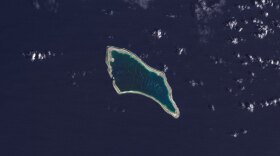Twenty Russian soldiers landed in Fiji earlier today to help with the transfer of a large shipment of weapons. Both Moscow and Suva say the arms are intended to upgrade Fiji's battalion of peacekeepers, based on the Golan Heights in Syria, but, as we hear from Neal Conan in the Pacific News Minute, opposition leaders in Fiji worry that they might also be used to suppress dissent.
On January 13th, a Russian flagged cargo ship called St Confidence unloaded twenty containers in Suva that were promptly whisked away to the Queen Elizabeth barracks. Amid mystery and rumors, Defense Minister Timoci Natuva finally told parliament that Prime Minister Frank Bainimarama had arranged the purchase of rifles, machine guns and military vehicles on his visit to Moscow in 2013. He also said the deal had to be kept secret because, quote "You don't have to go around calling out to people that we are providing ammunition to Fiji."
The battalion of UN peacekeepers represents a substantial fraction of Fiji's military force of 3500 men and their current weapons are out of date compared to the arsenals of the Syrian, Lebanese and Israeli forces in the same area.
But there are also reports that the shipment includes tear gas and other non-lethal munitions that seem better suited to crowd control. Politics in Fiji have been volatile, with four military coups since 1987. Frank Bainimarama lead the last one, in 2006, then was elected prime minister two years ago. Opposition groups argue that the military remains in effective control. Last week, after Parliament voted to suspend the National Federation Party on a technicality, opposition leader Ro Teimumu Kepa wore a black ribbon, "Because, "she said, "democracy, if it's not already dead, it is dying."





